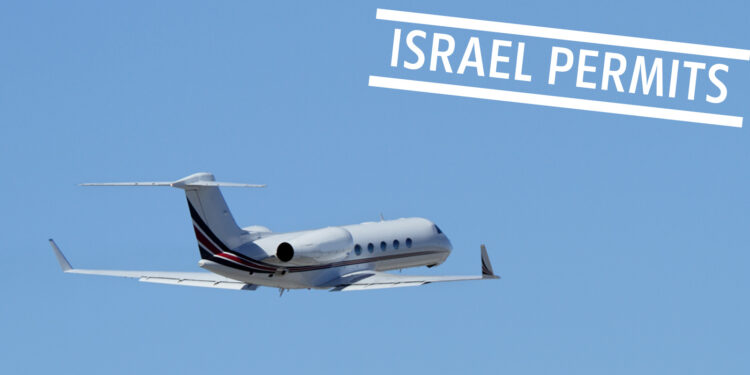Business Aviation Trip Planning Tips: Operating to Israel Part 2 – Operational Requirements

This business aviation blog post continues from our article last week, titled “Business Aviation Trip Planning Tips: Operating to Israel Part 1 – Permit Requirements.”
Israel takes security issues seriously, and crew onboard business aircraft must follow mandated procedures exactly on the day of operation. It’s recommended that first-time crews to Israel allow additional planning time to prepare for assorted security procedures that are unique to Israel.
The following is an overview of what operational requirements you need to know:
1. Prior-to-arrival procedures
Prior to arrival in Israel, the captain is required to log in at http://asoc.mot.gov.il/. This must be done on the ground at the last designated airport prior to landing in Israel, or at least 180 NM prior to entering Israeli airspace. The captain enters his/her username and password into a form on the website, and a six-digit “positive code” will be issued. Note that prior to any departure from Larnaca (LCLK) to Israel, it’s absolutely necessary to contact Aviation Security Operations Center (ASOC) by phone at +972-3-9599800.
2. Online application and password
Online landing permit applications may be submitted by your 3rd-party provider. A temporary login and password, however, will only be provided for the crew to use from that point on. Crew must log in and use their password prior to departure; therefore, additional time should always be allowed for doing so. Online signin, with password, is absolutely essential, or you will not be permitted to enter Israeli airspace.
3. Departure airport limitations
For any flight to Israel, you must depart from an “approved airport” and complete a pre-departure security clearance. The list of approved departure airports changes yearly, as indicated by Notice to Airmen. Note that most Islamic countries are not approved as departure points – with the exception of Jordan, where you may depart from Amman, Queen Alia (OJAI), Amman, Marka (OJAM), or Aqaba (OJAQ). If you wish to depart for Israel from an airport not on the list, you must first obtain approval from ASOC. To obtain this approval, you may need to volunteer to undergo a security screen, in advance, at an Israeli embassy. There’s no guarantee that ASOC will approve your alternate departure airport request, and all approvals are on a case-by-case basis. It’s also important to be aware that you’ll need to use approved routes and Flight Information Regions (FIRs) both into and out of the country.
4. Current list of departure airport options
As of December 13, 2013, the LLLL FIR is open for arrival of foreign aircraft coming in nonstop from the following list (bold-faced airport codes denote departure airports approved only for General Aviation [GA] operations):
CYYZ, EBBR, EBLG, EDDB, EDDF, EDDH, EDDK, EDDL, EDDM, EDDS, EDDT,
EDSB, EETN, EFHK, EGCC, EGGW, EGKK, EGLF, EGLL, EGSS, EHAM, EINN, EKCH, ENGM,
EPKK, EPKT, EPWA, ESSA, EVRA, EYVI, HAAB, HECA, KATL, KEWR, KJFK,
KPHL, LBBG, LBSF, LBWN, LCLK, LCPH, LDDU, LDPL, LDRI, LDSP, LDZA, LEBL,
LEMD, LEMG, LEPA, LFML, LFMN, LFPB, LFPG, LFPO, LGAV, LGIR, LGKO, LGKR, LGRP,
LGSA, LGTS, LHBP, LICC, LICJ, LIMC, LIME, LIPE, LIPX, LIRF, LJLJ,
LKMT, LKPR, LMML, LOWW, LROP, LSGG, LSZH, LTAI, LTBA, LTBJ, LTBS,
LTFE, LTFJ, LUKK, LWOH, LYBE, LZIB, LZKZ, OJAI, OJAM, OJAQ, RKSI,
UAAA, UBBB, UDYZ, UGSB, UGTB, UHHH, UKBB, UKCC, UKDD, UKFF, UKHH,
UKLL, UKOO, ULLI, UMKK, UMMS, UNNT, URKK, URMM, URRR, URSS, USCC,
USPP, USSS, UTTT, UUDD, UUEE, UUWW, UWKD, UWOO, UWUU, UWWW
It’s recommended that operators check, on a monthly basis, to determine if the above information has changed. A list of approved departure airports can be found at the Israeli Civil Aviation Authority website.
5. Tourism flight considerations
If you intend to operate a GA flight to Israel for purposes of tourism, there are additional security procedures. First, you must ensure that you have a local business contact in Israel (not a tourism company) who has a relationship with the passengers. For most GA tourism operations, you’ll also be required to visit an Israeli Embassy, for in-person security screening, prior to your permit being processed. For these reasons, GA tourism flights to Israel are rare.
Conclusion
Despite the complexity of the process, permit applications for Israel go through fairly smoothly – so long as all required information has been provided. It’s important to ensure that all submitted data is correct and information about your local business contact is complete. Due to the accountability that ASOC requires, it’s very important that your local contact understand the purpose of your trip and have a relationship with the passengers onboard.
Questions?
If you have any questions about this article or would like assistance planning your next trip to Israel, contact Christine Vamvakas at christinevamvakas@univ-wea.com.




